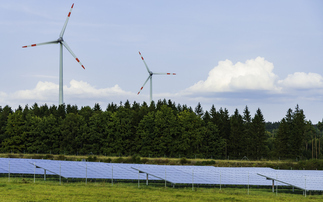By 2050 the UK must replace almost all current electricity capacity and build at least as much again in order to meet climate goals – this can only be funded on the basis of robust business models, explains Atkins Global's David Cole
In our 'Engineering Net Zero Technical Report', we explored how a pure low carbon generator business model could evolve, and deep systems and technology-specific change is needed. We analysed the published output of multiple modelling attempts, with particular focus on the large-scale power generation requirements. Current business models are not delivering new generation capacity at the required rate. The required build rate to achieve this is higher than the UK has ever achieved and more than double our current rate.
Prerequisites for investment must be met, including viable business models
Simply put, clear and sustained policy is required to progress and attract private investment and make progress - alongside a clear business model and market arrangements. The UK offshore wind demonstrates what is required - well over a decade of consistent policy, clear business model, top of merit order, paid for curtailment and a high average price paid through the CfD mechanism to start the programme off. We cannot tick the same boxes for CCS, nuclear and other requirements required now to achieve net zero by 2050.
In the underlying Climate Change Committee scenario, 40 per cent of the UK's energy in 2050 would depend on carbon capture and storage (CCS). With no business model nor yet even one full scale demonstrator project for CCS, arguably the only alternative firm power is nuclear. Despite long standing policy to build new nuclear, the business model selected by the government is non-viable; compare this with the massive market intervention and an extremely favourable business model have delivered offshore wind.
Technologies required to meet 2050 target need more support
One major restraining factor is the failure by the government to develop investible business models for firm power generation (both Combined Cycle Gas Turbines / power with CCS and nuclear).
In the absence of an engineering and operations-focussed whole system strategy, the focus on economic modelling of least cost systems and market distortion (to encourage offshore wind) has effectively frozen out other technologies. The implications for system stability and security of supply have not been adequately addressed and these risks do not appear to have been 'priced in' to the economic models. Anticipatory models of regulation would recognise this risk and create new institutions to manage them.
System transitions should be led by technology
Novel initiatives could maximise the potential of the demand side, and consumer participation in a net zero system. While many have merit in specific circumstances, they must be placed in the context of the massive demands of repowering UK for 2050. Most initiatives are neither large nor advanced enough to have a major system changing impact in the next 29 years.
Consumer data from a recent partnership study Utility 2050 shows the retail market may be more limited and problematic to engage than initially assessed. Many customers have become aware of the environmental impacts of different forms of generation - and the carbon intensity of different supplies is potentially a more significant motivator than price alone. Yet, customer awareness of climate change has created the opportunity for suppliers to market 'clean electricity' - indeed, the BEIS vision refers to 'incentivising people to move to clean energy solutions'. But, amongst the barrage of confusing claims from companies offering so-called 'green energy', it is fundamental to note there is no way of segregating or 'branding' electrons. The UK grid and the local distribution systems shift electrons between the generator and your home - regardless of their origin, they are just electrons. To bring customers along this journey, to engage them and to also change behaviours where required we need to be talking facts, not fiction and whole system costs.
In the wholesale generation market, BEIS has become the de-facto central buyer of electricity; BEIS effectively determines that new generation is built but there is no long-term strategic plan to guide this massive purchasing power.
Atkins isn't alone in calling for a separate body responsible for the delivery of a net zero system for 2050 and beyond. One of the functions of what we have coined 'Energy System Architect' would be to assess new technologies and market initiatives to improve the efficiency and robustness of the whole system.
Mature thermal power generation technology (pre-1990) was well suited to introduction into a competitive market. In the long term (beyond 2050) clean generation technologies (renewables, nuclear fission, fusion energy) will mature enough for competitive markets to operate. From now to 2050 the system configuration will be in transition and must be led by technology, with markets designed or managed to deliver diverse new technologies.
David Cole is market director at multinational engineering, design, planning, and consulting services company Atkins Global.
This article is sponsored by Atkins Global.








